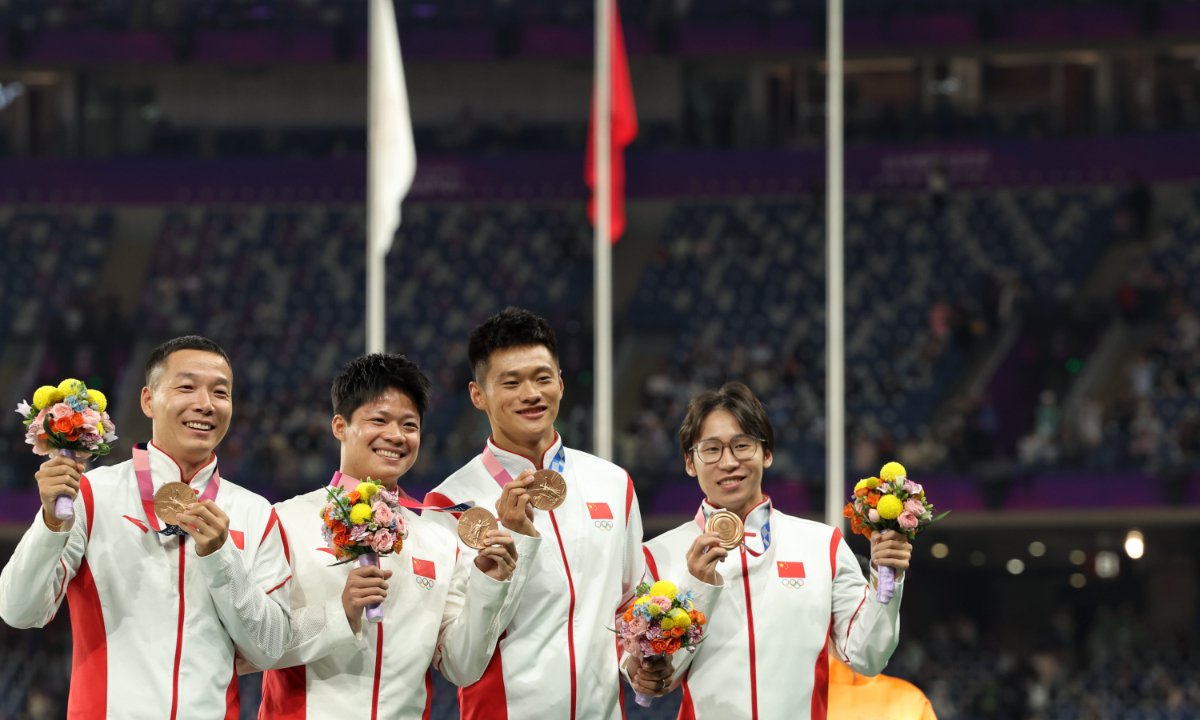Amidst a jubilant atmosphere at the Hangzhou Olympic Sports Center Stadium, the Chinese Olympic Committee (COC) celebrated the successes of its athletes with an unforgettable medal ceremony. On this memorable evening, the athletes who clinched the bronze for the men’s 4×100m relay at Tokyo 2020 were honored, along with the medalists of the women’s 20km race walks from the London 2012 Olympics. This special event was held after the athletic competitions of the 19th Asian Games, located in Hangzhou, Zhejiang Province.
Speaking about the recognition, a visibly proud 30-year-old sprinter, Xie Zhenye, told the Global Times, “This medal signifies a landmark achievement in Chinese athletics. The journey to this point was not devoid of challenges. Our relay team’s history at the Olympics doesn’t boast of noteworthy victories. However, this win firmly establishes our presence on the global athletic stage.”
The backstory behind this recognition starts in February 2022. The Court of Arbitration for Sport validated the accomplishments of the Chinese relay team—comprising Su Bingtian, Xie, Wu Zhiqiang, and Tang Xingqiang—as the legitimate bronze medalists for the men’s 4×100-meter relay at the Tokyo 2021 Olympics. This acknowledgment came after Team Great Britain faced penalties. The team’s lead runner, Chijindu Ujah, had contravened anti-doping protocols. Validating this shift in standings, the International Olympic Committee (IOC) confirmed on May 19, 2022, that the bronze medal would be re-awarded to Team China. This achievement is historic, marking China’s inaugural Olympic medal in relay and their second in sprints. The first sprint win was courtesy of the iconic Liu Xiang, who triumphed in the men’s 110m hurdles at the Athens 2004 Games.
Looking ahead, Xie is optimistic. Reflecting on the significance of this acknowledgment, he remarked, “This accolade is more than a medal; it is a legacy. It serves as a beacon for the upcoming talent, especially those preparing for the Paris 2024 Olympics. If we could set this precedent, I’m confident that the future will only shine brighter for Chinese athletics.”
This statement from Xie wasn’t just mere words, as he echoed the same sentiment at a press briefing post his victory in the men’s 4x100m relay at the Asian Games, “We’ve set a standard; now it’s up to the next generation to elevate it further.”
Parallel to the men’s relay team’s story, there was another significant announcement in March 2023. The gold medalist of the women’s 20km race walk from the London Olympics had been stripped of her title due to doping infringements. This led to a reshuffling of the standings. Consequently, China’s Qieyang Shijie, Liu Hong, and Lu Xiuzhi were declared the gold, silver, and bronze medalists, respectively, for the women’s 20km race walks from London.
This change in medal standings meant Qieyang, hailing from Qinghai Province, Northwest China, etched her name in history as the first Tibetan Olympic gold medalist.
Not resting on these laurels, Team China displayed their dominance at the Hangzhou Asian Games in race walking. The quartet of Wang Qin, He Xianghong, Qieyang, and Bai Xueying dominated the 35km mixed team final. Qieyang showcased her mettle by topping the female athletes with an impressive time of 2 hours 45 minutes 13 seconds. Collaboratively, with Wang’s time of 2 hours 31 minutes 28 seconds, Team China secured the gold with an aggregate time of 5 hours 16 minutes 41 seconds.
The 35km mixed race was making its debut at the Asian Games, and the Chinese team’s scintillating performance not only secured gold but also established an Asian record. An ecstatic Qieyang, reflecting on this achievement, stated in a post-match interview, “The dual recognition at the Olympics and the Asian Games has bolstered my confidence. It’s not just about personal glory; I aim to inspire and be a beacon for many.”
Sport analysts and commentators emphasize that this era marks a pivotal shift in Chinese athletics. The current squad, though young, is holding its ground, continuing China’s legacy of clinching the highest gold tally, especially on home ground. The medal ceremony at the Asian Games isn’t merely a celebration of past triumphs. It is a symbol of the nation’s relentless pursuit of excellence, a tribute to past achievements, and a clarion call for future glories.
Read More:
